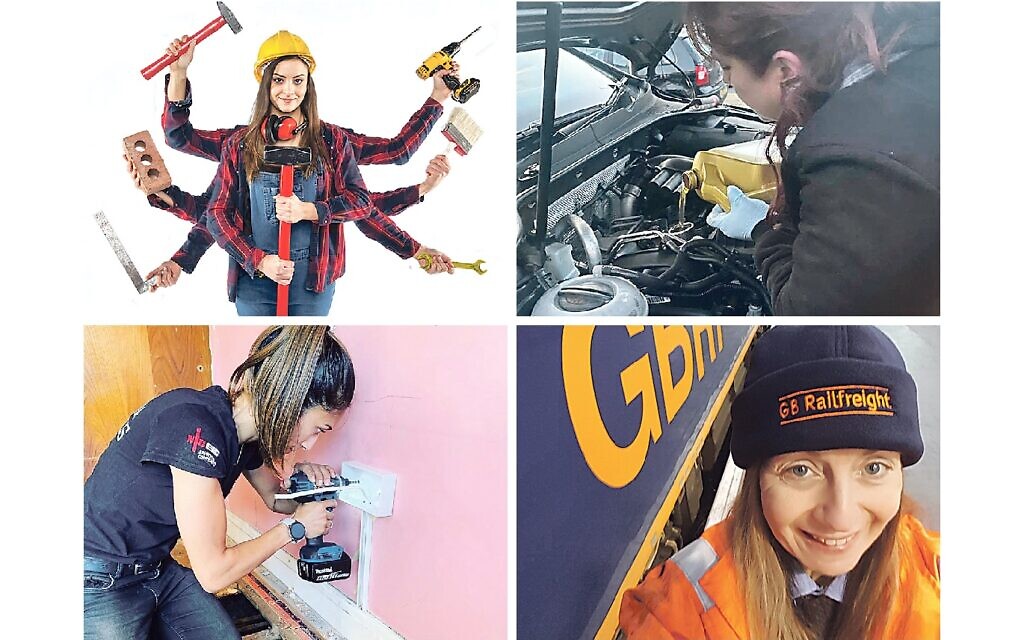Meet the women taking on traditionally male jobs, and changing attitudes
Louisa Walters speaks to four Jewish women working in male-dominated jobs about why they love being treated as ‘one of the boys’
THE MECHANIC
Working for The Financial Times sounds super interesting but, after six years of doing data entry at the broadsheet, 43-year-old Emma from north London decided she was ready for a challenge.
“I realised that a desk job simply wasn’t me and, despite my sparkly fingernails, the idea of getting my hands dirty was really appealing,” she says.
Get The Jewish News Daily Edition by email and never miss our top stories Free Sign Up
“My dad is a TV engineer and I always loved messing around in his workshop, taking things apart and putting them together.”
Emma enrolled at night school to do a City & Guilds in motor vehicle servicing and engine repairs – not surprisingly, she was the only woman on
the course.
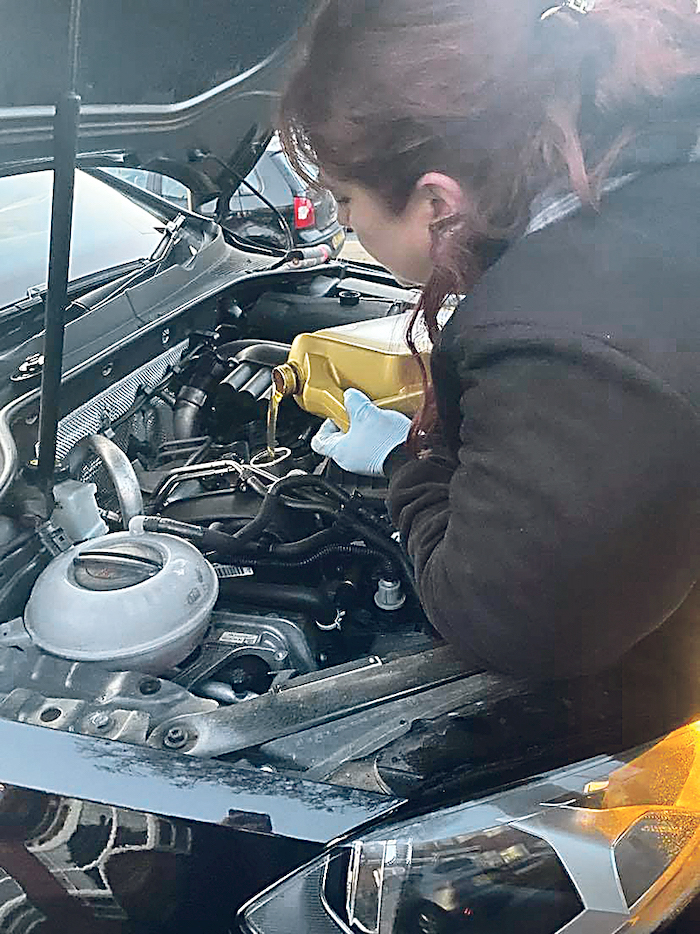
She has now been working as a car mechanic for 20 years. Her first job was in a small independent garage and then in 2005 she landed a role at
Volkswagen.
“They took me in, treated me as one of the boys, and I loved it!” she says.
After 10 years, when the cost of childcare became too high for her to work full-time, she left, bought herself a set of tools and literally went on the road as a mobile mechanic.
Recommendations come via word of mouth and Facebook groups. Emma is a true dichotomy – in her spare time, she bakes celebration cakes.
“I have a logical side and a creative side. Being a car mechanic is dirty and horrible, but I love it!”
Recent figures show women account for 10% of all UK mechanics
THE ELECTRICIAN
Diminutive and bubbly, 28-year-old Naomi grew up in an observant household in north London and attended Hasmonean High School for Girls.
She dallied with a career in music and then as a personal trainer but then, in a lightbulb moment (excuse the pun) she hit upon the idea of being
an electrician.
“My mum thought I was nuts, but she was very supportive and now thinks it was the best decision I ever made.”
Naomi enrolled at evening classes to train and one day was at her neighbour’s house when their electrician was there. They got chatting, he took her on as an electrician’s mate and then she learned on the job.
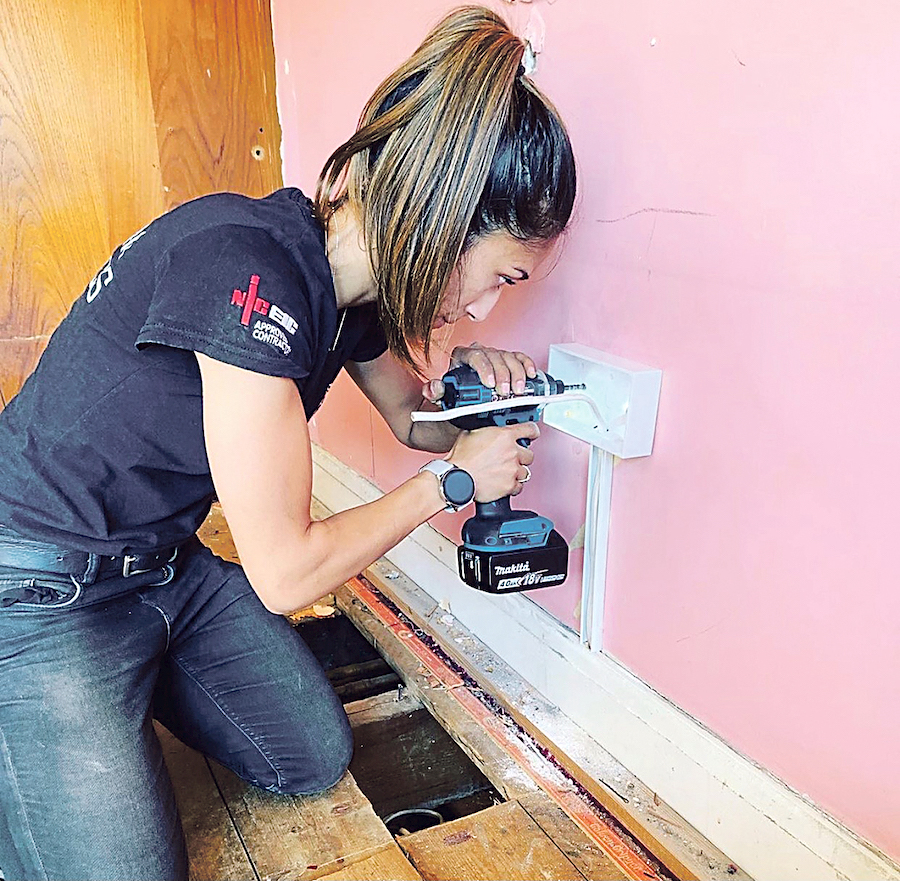
“Working all around north London for two lovely Jewish bosses was a great way to get started,” says Naomi. For a bit of fun, she set up an Instagram account, @tinysparkldn, and got discovered by a central London company looking for someone to join their team.
“I was offered a salary I couldn’t resist and also the lure of a more creative role doing much bigger projects. I miss working for the Jewish community, but I love the commercial and industrial jobs I am doing now.”
Naomi is very much a woman in a man’s world. “I never turn up to a job without a full face of make-up – clients are often taken aback to see a properly groomed female electrician!
“The nature of the work can put women off, but we are fully capable – in some respects, we are far more suited! We have a keen eye for detail and are more likely to be careful about protecting surfaces and ensuring a tidy finish.
“I’m 4ft 9in, so I can squeeze into places the guys can’t reach, like under floorboards and in the eaves. I’ve had to overcome some fears though – rodents and spiders do not make for a glamorous working environment! “
Out of more than 250K electricians in the UK, around 2,000 are female
THE PRISONER OFFICER
When 23-year-old Samantha (not her real name) from north London was finishing her degree in psychology with criminology, she came across a graduate scheme for a prison officer at a high security prison and thought it sounded interesting. She applied and was accepted.
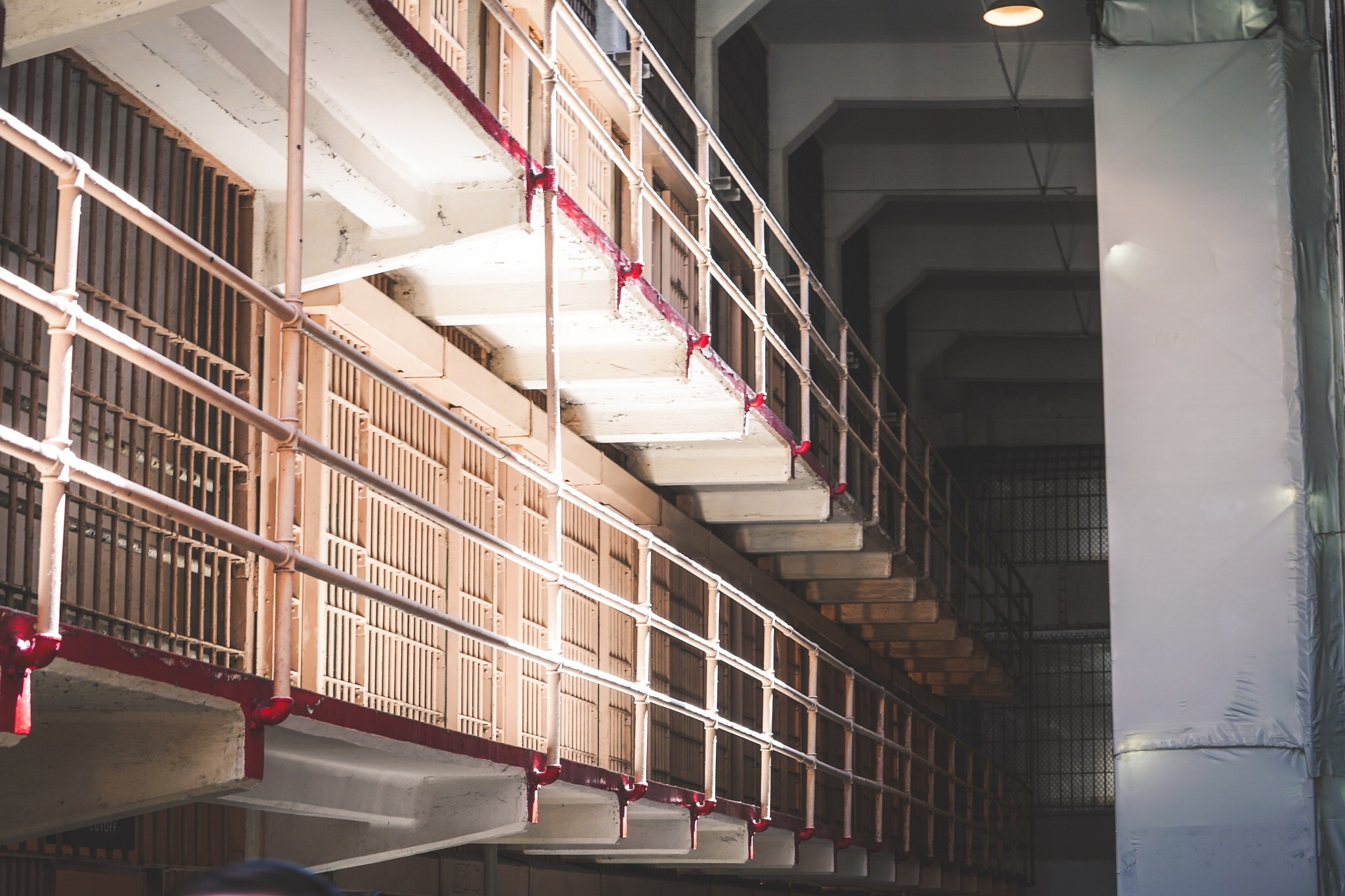
“At first, my parents were really worried about my safety,” she says. “Prison is a very dangerous environment, and I am working with some extremely dangerous individuals. Two years on, they are a lot more relaxed as they know I feel safe at work. My friends are very supportive and are always calling to find out about my day!”
A typical day involves unlocking prisoners (for exercise, showers, to collect meals, to go to work around the prison), rub-down searches, daily cell checks and more.
However, prison is a volatile environment and although this regime may sound simple to facilitate, it usually is not. There are frequent incidents, such as drug overdoses, violence and self-harm, that disrupt the operation of the wing.
Samantha’s job is to help convicts deal with being in prison and address their offending behaviour. This is done through rehabilitating and training offenders, plus giving them advice, support and counselling.
“I feel there are many benefits of females working in a masculine subculture,” says Samantha. “In my experience, female officers are less inclined to resort to force and prefer to de-escalate situations using interpersonal skills.
“This allows for female officers to build particularly good rapport with prisoners, and subsequently reduce violence. However, I have found that male staff doubt the physical and emotional strength of females.
“While I understand the need for physical back-up in times of violence, I frequently witness female members of staff de-escalating situations
that otherwise would have resulted in potential staff assaults.”
Traditionally, prisons were a place of punishment; male officers would come to work to ensure secure custody and were orientated by security and control.
Now, they are a place of rehabilitation. Prison officers are encouraged to empathise with the human condition of prisoners and bring new ideas to reform them, to help them make better, more positive choices and prepare for life outside prison.
“In line with the prison reform, the role has become more suitable for women. It is emotionally challenging, but has the reward of making a positive contribution to the care of those in custody and contributing to reducing the huge cost of them reoffending,” explains Samantha.
“Men outnumber women by three to one, but I do not really consider myself to be one of the boys. I am a girlie girl and I get along with everyone, but I like working with another female on my shift as most have a similar attitude to me.”
In 2018, women accounted for just over a quarter of 21,600 prison officers in England and Wales
THE TRAIN DRIVER
Maddy, 56, from Borehamwood, recalls how as a child her parents read Thomas The Tank Engine stories to her and, from then on, she knew she wanted to be a train driver one day.
She began her working life as a research chemist, but had to give up when she was diagnosed with myalgic encephalomyelitis or ME.
“Thankfully, I made a full recovery, but the episode made me realise that life isn’t a rehearsal – it was time to make my dreams come true,” she says.
Maddy kept asking various train companies to take her on, until Connex South Central said yes.
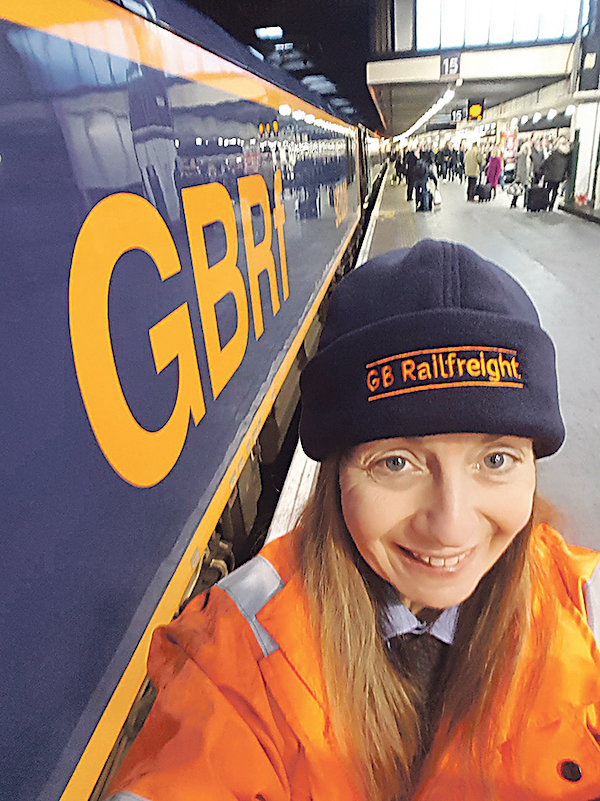
Instead of working her way through the ranks, as was traditional since steam days, she started as a driver-in-training (‘boil-in-the-bag’ driver, as she was called by the older men).
Maddy has now been driving trains for 22 years and is currently a locomotive engineer (freight train driver).
“My parents were concerned it wouldn’t be a suitable job for their daughter, but were very proud when I made it!” says Maddy. “I can be working any time of day or night, 24/7, and I work almost exclusively among men.
“There is one other female driver at my depot, plus I know a few other female drivers and ground staff (who prepare trains and control movements in yards etc).
“I was the first female mainline driver for GBRf (GB Railfreight). Female freight drivers are quite rare compared to passenger train drivers and tube drivers, but more women are now being taken on.
“There are many disadvantages to being female, the biggest being a lack of decent toilet facilities while on the road – of course this affects men, too.
Just 6.5% of drivers in England, Wales and Scotland are women
“There are issues with women’s’ health (such as menopause) that are not understood by our mostly-male management, although these are now being addressed. There is a lot of heavy lifting, it is dirty, there are long shifts and you need to be very mechanically minded. But I love it!”
Maddy likes having female colleagues, but she can also be one of the lads. “I am a bit of a tomboy – always in boots/jeans, I play a big brass instrument and I used to ride a motorbike – but I like to dress up for a special occasion too.”
When the UK went into lockdown in March, Maddy was considered a key worker and carried on working, but contracted Covid-19 and has since experience long Covid symptoms. She hopes to get back on the tracks soon.

Thank you for helping to make Jewish News the leading source of news and opinion for the UK Jewish community. Today we're asking for your invaluable help to continue putting our community first in everything we do.
For as little as £5 a month you can help sustain the vital work we do in celebrating and standing up for Jewish life in Britain.
Jewish News holds our community together and keeps us connected. Like a synagogue, it’s where people turn to feel part of something bigger. It also proudly shows the rest of Britain the vibrancy and rich culture of modern Jewish life.
You can make a quick and easy one-off or monthly contribution of £5, £10, £20 or any other sum you’re comfortable with.
100% of your donation will help us continue celebrating our community, in all its dynamic diversity...
Engaging
Being a community platform means so much more than producing a newspaper and website. One of our proudest roles is media partnering with our invaluable charities to amplify the outstanding work they do to help us all.
Celebrating
There’s no shortage of oys in the world but Jewish News takes every opportunity to celebrate the joys too, through projects like Night of Heroes, 40 Under 40 and other compelling countdowns that make the community kvell with pride.
Pioneering
In the first collaboration between media outlets from different faiths, Jewish News worked with British Muslim TV and Church Times to produce a list of young activists leading the way on interfaith understanding.
Campaigning
Royal Mail issued a stamp honouring Holocaust hero Sir Nicholas Winton after a Jewish News campaign attracted more than 100,000 backers. Jewish Newsalso produces special editions of the paper highlighting pressing issues including mental health and Holocaust remembrance.
Easy access
In an age when news is readily accessible, Jewish News provides high-quality content free online and offline, removing any financial barriers to connecting people.
Voice of our community to wider society
The Jewish News team regularly appears on TV, radio and on the pages of the national press to comment on stories about the Jewish community. Easy access to the paper on the streets of London also means Jewish News provides an invaluable window into the community for the country at large.
We hope you agree all this is worth preserving.
-
By Laurent Vaughan - Senior Associate (Bishop & Sewell Solicitors)
-
By Laurent Vaughan - Senior Associate (Bishop & Sewell Solicitors)
-
By Laurent Vaughan - Senior Associate (Bishop & Sewell Solicitors)
-
By Laurent Vaughan - Senior Associate (Bishop & Sewell Solicitors)


